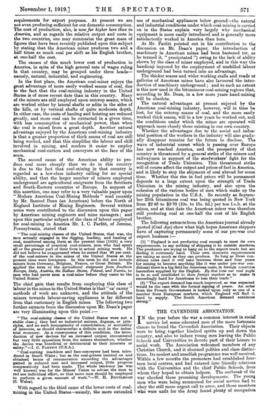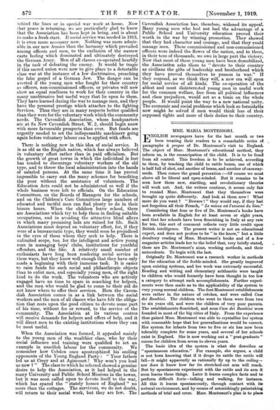111k, CAVENDISH ASSOCIATION.
IN the year before the war as common interest in social service led some educated men of• the more fortunate classes to found the Cavendish Association. Their objects were to bring together kindred spirits up and down the country, and also to induce young men leaving the Public Schools and Universities to devote part of their leisure to social work. The Association welcomed members of any Christian Church, and it shunned• politics and class distinctions. Its modest and unselfish programme was well received. Within a few months the promoters had established fourteen local centres, and had entered into friendly relations with the Universities and the chief Public Schools, from whom they hoped to obtain helpers. The outbreak of the war checked these promising developments. The young men who were being summoned for social service had to obey the still more urgent call to arms, and those members who were unfit for the Army found plenty of occupation 'Deliind the lines or in special war work at home. Now that peace is returning, we arc particularly glad to know that the Association has been kept in being, and is about to make a fresh start. If social service was needed in 1913, it is even more necessary now. Nothing was more admirable in our new Armies than the harmony which prevailed among officers and men, to the exclusion of the narrow caste feeling which dominated and ultimately destroyed the German Army. Men of all classes co-operated heartily in the task of defeating the enemy. It would be tragic if this sacred union were now to give place to a detestable class war at the instance of a few doctrinaires, preaching the false gospel of a German Jew. The danger can be averted if the young men who fought for their country as officers, non-commissioned officers, or privates will now show an equal readiness to work for their country in the many unobtrusive but useful ways that lie open to them. They have learned during the war to manage men, and they have the personal prestige which attaches to the fighting Services. Thus they are in many respects better qualified than they were for the voluntary work which the community needs. The Cavendish Association, whose headquarters are at 8i New Cavendish Street, W. 2, should begin anew with more favourable prospects than ever. But funds are urgently needed to set the indispensable machinery going again before voluntary labour can be applied with effect.
There is nothing new in this idea of social service. It is as old as the English nation, which has always believed in voluntary effort rather than in paid officialism. But the growth of great towns in which the individual is lost has tended to discourage voluntary workers of the old type, and to throw the local administration into the hands of salaried persons. At the same time it has proved impossible to carry out the many schemes for benefiting the poor without the assistance of volunteers. The Education Acts could not be administered so well if the whole business were left to officials. On the Education Committees, on the Boards of Managers for the schools, and on the Children's Care Committees large numbers of educated and tactful men can find plenty to do in their leisure hours. When the children leave school, there are Associations which try to help them in finding suitable occupations, and in avoiding the attractive blind alleys in which many promising lads are ruined for life. Such Associations must depend on voluntary effort, for, if they were of a bureaucratic type, they would soon be prejudiced in the eyes of those whom they seek to help. There is unlimited scope, too, for the intelligent and active young man in managing boys' clubs, institutions for youthful offenders, and the like. A relatively small number of enthusiasts have long been rendering social service in these ways, but they know well enough that they have only made a beginning with their immense task. It is easier to raise funds for such social and philanthropic objects than to enlist men, and especially young men, of the right kind to do the work. The volunteers who are actively engaged have no time to spare in searching for helpers, and the men who would be glad to come to their aid do not know where to offer their services. Here the Caven. dish Association comes in as a link between the social workers and the men of all classes who have felt the obligation that rests upon the good citizen to devote some part of his time, without fee or reward, to the service of the community. The Association at its various centres will receive demands for helpers and offers of help, and it will direct men to the existing institutions where they can be most useful.
When the Association was formed, it appealed mainly to the young men of the wealthier class, who by their social influence and training were qualified to set an example in unselfish labour for the community. We remember how Cobden once apostrophized his smiling opponents of the Young England Party : " Your fathers led us at Crecy and at Agincourt ! Why won't you lead us now ? " The class to which he referred showed a genuine desire to help the Association, as it had helped in the many University and Public School Missions in the towns, but it was soon called upon to devote itself to the war, which has spared the " stately homes of England " no more than the cottages. The survivors, we do not doubt, will return to their social work. but they are few. The Cavendish Association has, therefore, widened its appeal. Many young men who had not had the advantage of a Public School and University education proved their worth in the war by winning promotion. They showed that they had character and courage, and that they could manage men. These commissioned and non-commissioned officers were indeed the flower of the nation, and to them, in their tens of thousands, we owe in large part the victory. Now that most of these young men have been demobilized, the Associatkon asks them to " devote to their country as civilians the gifts of leadership and brotherhood which they have proved themselves to possess in war." If they respond, as we think they will, a new era will open for social service of all kinds. The co-operation of the ablest and most disinterested young men in useful work for the common welfare, free from all political influences and class prejudices, would act as a tonic on the whole people. It would point the way to a new national unity. The economic and social problems which look so formidable now might be solved if men would think less of their supposed rights and more of their duties to their country.







































 Previous page
Previous page